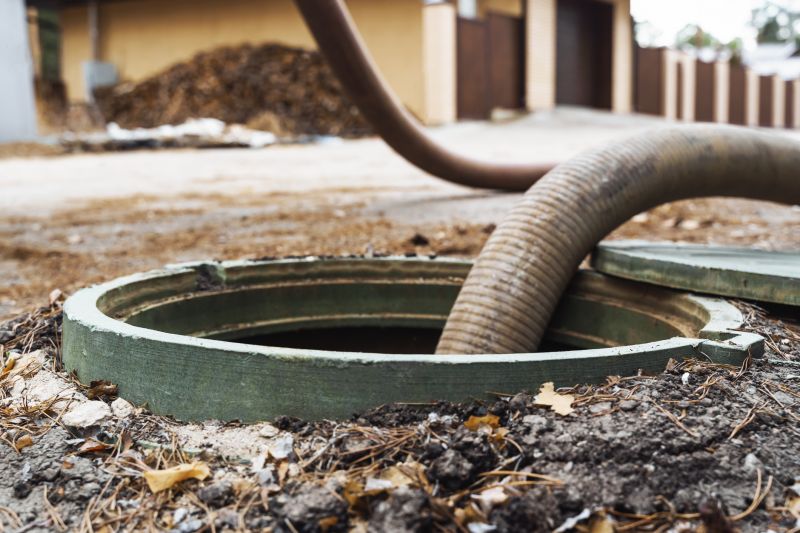Expert Picks For Septic Tank Pumping And Cleaning Solutions
Choose from top-rated products recommended by septic system professionals for thorough and hassle-free cleaning.
 Maintaining a septic tank involves regular pumping and cleaning to ensure proper function and prevent costly repairs. The process typically includes removing accumulated sludge and scum, which can hinder the tank’s efficiency if left unaddressed. Various products and tools are available to assist homeowners and professionals in performing these tasks effectively. From specialized pumps and hoses to cleaning additives and inspection tools, the right equipment can make septic maintenance safer and more efficient.
Maintaining a septic tank involves regular pumping and cleaning to ensure proper function and prevent costly repairs. The process typically includes removing accumulated sludge and scum, which can hinder the tank’s efficiency if left unaddressed. Various products and tools are available to assist homeowners and professionals in performing these tasks effectively. From specialized pumps and hoses to cleaning additives and inspection tools, the right equipment can make septic maintenance safer and more efficient.
Top Overall Option
Heavy-Duty Septic Pumping System
This versatile and durable septic pumping system is designed to handle a wide range of tank sizes and conditions. It features a powerful motor, reinforced hoses, and easy-to-use controls, making it suitable for both professional use and serious DIY maintenance. Its robust construction ensures reliable performance during pumping operations, helping to efficiently remove sludge and scum. While it does not promise guarantees, its adaptability and strong build make it a valuable tool for septic system upkeep.
Types of Products For Septic Tank Pumping And Cleanings
Portable Septic Pumps
Compact and lightweight pumps suitable for small to medium tanks, offering ease of transport and operation.
Submersible Sewage Pumps
Deeply submersible units designed for heavy-duty pumping of waste from underground tanks.
Vacuum Truck Attachments
Specialized hoses and nozzles compatible with vacuum trucks for large-scale septic cleaning.
Inspection Cameras
Flexible cameras that help visualize tank interiors and identify potential issues.
Sludge Level Indicators
Devices that measure the amount of sludge and scum in the tank, aiding maintenance planning.
Septic Tank Cleaning Additives
Biological or chemical solutions that assist in breaking down solids and preventing buildup.
Drain Field Aerators
Equipment used to aerate drain fields and improve effluent absorption.
High-Pressure Water Jets
Tools that use high-pressure water to clean tank walls and pipes.
Tank Inspection Ports
Access points that facilitate inspection and maintenance of septic tanks.
Drain Field Cleaners
Products designed to clear clogs and maintain drain field integrity.
Septic Tank Rakes and Scoops
Manual tools for removing debris and sludge from accessible areas.
Portable Drain Cleaning Machines
Equipment that helps clear clogs in septic lines and pipes.
Septic Tank Filters
Filters that prevent large solids from entering the drain field.
Chemical Neutralizers
Products that neutralize odors and stabilize waste decomposition.
Flow Meters
Devices that monitor the flow rate within septic systems for diagnostics.
Pump-Out Hoses and Nozzles
Durable hoses and nozzles designed for efficient waste removal.
Septic System Maintenance Kits
Complete kits containing various tools and supplies for routine maintenance.
Popular Choices
Widely used for small-scale maintenance and emergency pumping tasks.
Commonly selected for their ability to handle heavy waste loads in various tank sizes.
Popular for large-scale septic cleaning operations and commercial use.
Favored for their ability to provide visual access to tank interiors.
Trusted tools for monitoring sludge accumulation without invasive procedures.
Commonly used products that support waste breakdown and odor control.
Popular for maintaining drain field health and performance.
Effective tools for cleaning tank walls and pipes during maintenance.
Essential for easy access and thorough inspections.
Frequently chosen to prevent clogs and maintain proper drainage.
Manual tools often used for debris removal in accessible areas.
Popular for clearing stubborn clogs in septic lines.
Commonly installed to protect drain fields from solids.
Widely used to manage odors and promote waste decomposition.
Helpful for monitoring system performance and diagnosing issues.
Standard equipment for efficient waste removal during pumping.
Popular all-in-one solutions for routine upkeep.
Septic tank pumping often requires durable equipment capable of handling the challenging task of extracting waste from underground tanks. Proper cleaning not only involves removing solids but also inspecting the tank for potential issues such as cracks or leaks. Accessories like inspection cameras and sludge level indicators can help identify problems early, saving time and money. Choosing the appropriate products depends on tank size, location, and the specific needs of the system.
In addition to mechanical tools, cleaning solutions and additives can assist in breaking down organic matter and preventing buildup. These products are designed to support the natural bacterial processes within the tank, promoting healthy decomposition. When selecting products for septic maintenance, it is important to consider compatibility with existing systems and the safety of household plumbing. Properly maintained equipment and supplies contribute to the longevity and efficiency of septic systems, reducing the likelihood of emergency repairs and system failures.
Key Buying Considerations
- Tank size and capacity to ensure compatibility with the equipment.
- Type of waste being handled, such as liquid or semi-solid waste.
- Portability and ease of transport for manual or portable pumps.
- Power source availability, such as electric, gas, or manual operation.
- Durability and build quality to withstand harsh conditions.
- Ease of use and maintenance requirements of the equipment.
- Compatibility with existing septic system components.
- Safety features, including automatic shut-offs and protective covers.
- Accessory options like inspection cameras or sludge indicators for comprehensive maintenance.
- Cost considerations relative to the scope of maintenance tasks.
- Availability of replacement parts and customer support.
- Environmental safety and proper disposal methods for waste.
- Size and reach of hoses or cables for accessing difficult areas.
- Brand reputation and user reviews for reliability insights.
- Compliance with local regulations and standards.
